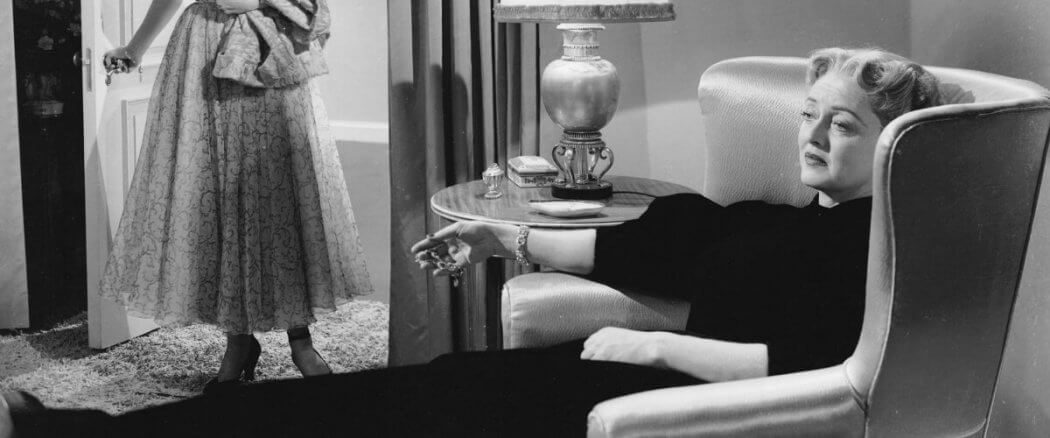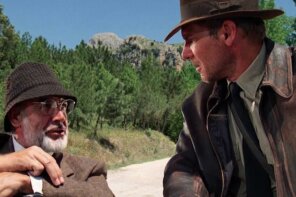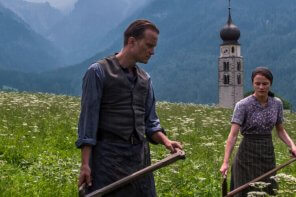“In the first week of April 1940 there were few men in the world who could have believed that, in less than three months, Denmark, Norway, Belgium, Holland and France would fall to the German invaders. But there were some men, ordinary men, not prophets, who knew this mighty tragedy was on the way. They had fought it from the beginning, and they understood it.”
This precedes Watch on the Rhine, and although in 2016 we’re not accustomed to prologues in film, even an audience member in 1943 must have been a bit perplexed by it. How can enemies understand each other? Analyze, yes, but understand? It implies a commonality. And what could anti-fascism and Nazism have in common? Just one thing. People.
Smug Outrage
In peril and ill health, anti-fascist leader Kurt Müller (Paul Lukas) has fled Germany for the United States, with his wife Sara (Bette Davis) and children Joshua, Bodo, and Babette. Their safe house belongs to Fanny Farrelly, Sara’s mother, a Boss Lady who only controls because she cares. But Fanny will soon realize how little she can control when one of her other houseguests, a dangerous fool named Teck de Brancovis (George Coulouris), picks up a few clues and threatens to drop them off at the German embassy, jeopardizing Kurt, the underground anti-fascist movement, and both families.
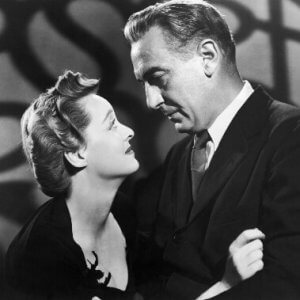 Watch on the Rhine, a stage play by Lillian Hellman adapted for the screen by Dashiell Hammett, opens like a drawing room comedy, endearing us with the sophistication and silliness of the Farrellys, but it wrenches into a moral drama when the Müllers arrive. The contrast was deliberate on behalf of Hellman, intended to attract then correct Americans who were, as Bosley Crowther observed, “serene in their neat security, [unaware] that the spreading disease called fascism was not remote from our shores and it was not an academic problem to be met with good intentions and smug outrage.”
Watch on the Rhine, a stage play by Lillian Hellman adapted for the screen by Dashiell Hammett, opens like a drawing room comedy, endearing us with the sophistication and silliness of the Farrellys, but it wrenches into a moral drama when the Müllers arrive. The contrast was deliberate on behalf of Hellman, intended to attract then correct Americans who were, as Bosley Crowther observed, “serene in their neat security, [unaware] that the spreading disease called fascism was not remote from our shores and it was not an academic problem to be met with good intentions and smug outrage.”
Yet even Hellman, a member of the Communist party who refused to “cut [her] convictions to fit this year’s fashions,” was not so smug to fix a boxing match for our satisfaction, declaring a false victor and ignoring the bloodshed. Instead, she chooses a far more unsettling approach: the truth.
The Big Frost
“The New World has left the room,” Teck remarks to Kurt, after the Farrellys depart to obtain a bribe to silence him. “I feel less discomfort with you. We’re Europeans, born to trouble and understanding it. They’re young; the world has gone well for most of them. For us…we’re like peasants watching the big frost. Work, trouble, ruin. But no need to call curses at the frost: there it is, there it will be again, always, for us…I do not say that you want to understand me, I say only that you do.”
We can hardly tolerate such understanding; it clouds our moral clarity. But Kurt nearly agrees; for all his sermons and sacrifices, he does not envision himself a peacemaker deserving a harvest of righteousness. “It is not noble,” he says, “it is only the way I must live.” That way gets in the way of others – and each way seems right to them.
The Fumes of Belief
“I have done something bad tonight…” Kurt confesses to his children near the film’s conclusion. “You could not do a bad thing,” the children insist, already past forgive and forget and ready to fight. “Now let us get straight together…” Kurt persists, “do you remember when we were at Les Miserables?…The man in the book stole bread. ‘The world is out of shape,’ we said, ‘when there are hungry men.’ And until it gets in shape, men will steal and lie and kill. But for whatever reason it’s done, and whoever does it, you understand, it is all bad. I want you to remember that. Whoever does it. It’s bad. But you will live to see the day when it will not have to be…There are men who are going to make sure it will not have to be…In every town, every village, every mud hut in the world there is always a man who loves children and who will fight to make a good world for them.”
This monologue is the mixed moral to Kurt’s story, which he believes will be ending soon, as he returns to Europe and leaves his family in the United States. Paul Lukas’ performance is flawless: a worn conviction, burdened by responsibility, running on the fumes of belief. “We’re never going to win the world / we’re never going to stop the war / we’re never going to beat this / if belief is what we’re fighting for,” writes John Mayer, but not about World War II and he doesn’t have children.
A Good Life
Children are in every scene of Watch on the Rhine, even when they aren’t. “You wanted a good life for your children,” Sara explains to Fanny, “we want it for ours, too. This is Kurt’s way of trying to get it for them.” Fanny marvels at Sara, “I would like to have been like you.” Somewhere the adults know that they must become like children again, but they cannot understand how. And so they fiercely defend the kingdom and inadvertently enlist their sons and daughters.
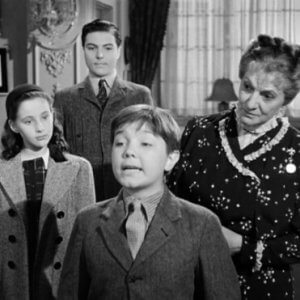 “To 1943 audiences, Teck is a threat to the basic social unit: the family,” Bernard F. Dick states in the film’s commentary. “Several films of the period stress the impact of the war on the family…[it] had become a sacred institution…the Müllers were also a family who believed in the principle of succession, almost as if they were royalty…if Kurt does not return, Joshua will continue his work and prepare Bodo to do the same…a resistant movement is a kind of a apostolate, in which disciples continue the work when their leader no longer can.”
“To 1943 audiences, Teck is a threat to the basic social unit: the family,” Bernard F. Dick states in the film’s commentary. “Several films of the period stress the impact of the war on the family…[it] had become a sacred institution…the Müllers were also a family who believed in the principle of succession, almost as if they were royalty…if Kurt does not return, Joshua will continue his work and prepare Bodo to do the same…a resistant movement is a kind of a apostolate, in which disciples continue the work when their leader no longer can.”
To be clear, I am not insinuating that anti-fascism is a cause with questionable motives or merit. I am grateful to those men and women who wildly hacked at the Nazi regime as it coiled around the world in a stranglehold. But the genius of Hellman, and Watch on the Rhine, is its understanding, or lack thereof, regarding the heart – deceitful above all things, beyond cure, even as it wants to do what is right.

